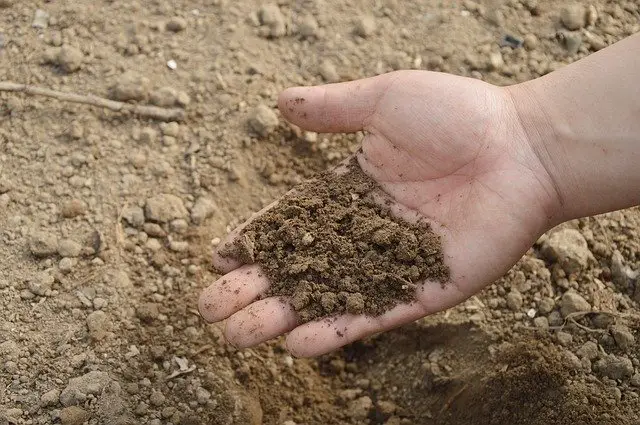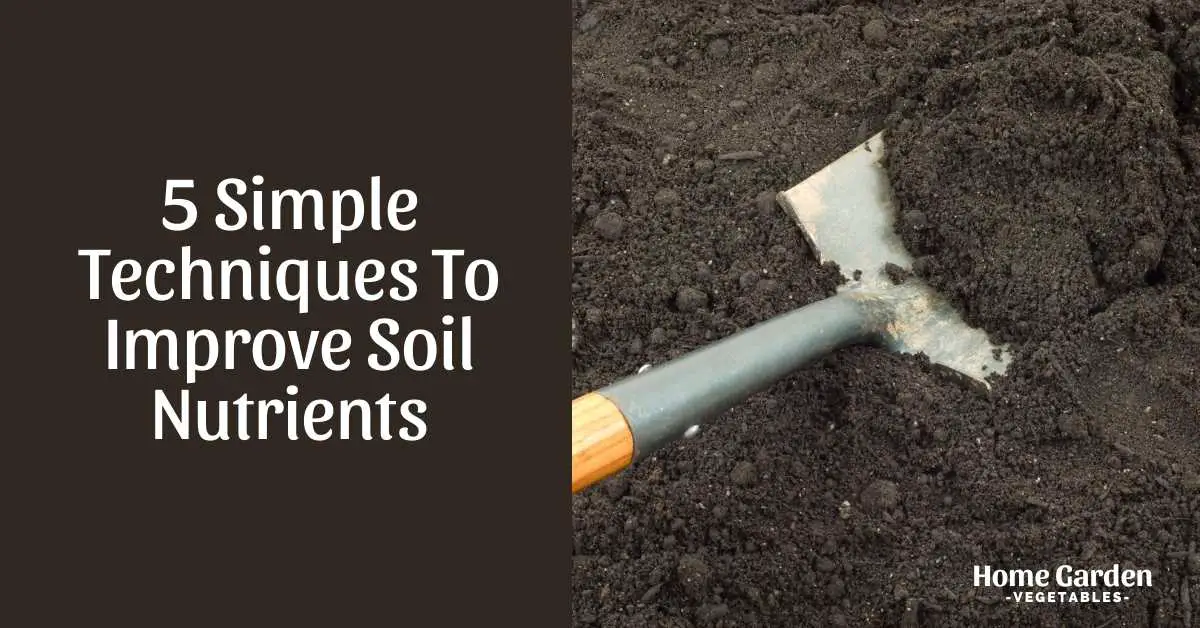In order to keep your vegetable garden productive, you must make sure your soil is managed correctly. Poor soil nutrient levels will result in lower quality crops and smaller fruits and vegetables. Learn all there is to know about how to improve soil nutrients.

Get The Soil Tested
If you’re specific about your garden and want an accurate insight on the type of nutrients accessible to your crops, a soil test is the key. Getting a soil test will tell you exactly what nutrients your soil is short of, so you know what can be done to improve the nutrient concentration for your plants.
Reader Poll: What online courses would interest you?
For a quick soil analysis, you can purchase a soil testing kit from the garden center or order one online. It’s easy to perform on your own, even if you’re a beginner. Just follow the instructions and you’ll know what to do. However, these kits will not give you an in-depth analysis.
The best solution is to take the soil sample to your local county extension and ask them to conduct the soil test for you. They’ll provide you with a detailed soil test report, including readings for the soil pH, and concentrations for potassium, phosphorus, magnesium, sulfur, calcium and other nutrients. It will also tell you the level of organic matter in the soil.
With the soil test report, you’ll know what components are missing or inadequate in your soil and how to adjust them. With these suggestions, you can make the appropriate amendments to the soil to cover the shortage. Alfalfa meal, for instance, adds nitrogen, phosphorus and potassium to the soil. Bone meal adds phosphorus and calcium. Worm castings can be added to the soil if it’s short of nitrogen.
Subscribe to our newsletter!
Why Are Nutrients Important For The Vegetable Garden?
Vegetables and plants in general, grow using energy from the sun and the nutrients taken from the soil. They need nutrients for the same reasons we do: to germinate, grow, reproduce, as well as to help fight off pests and diseases. Let’s take a look at the most essential nutrients and why they are important for the vegetable garden:
Nitrogen
Aids in the creation of amino acids, which in turn make proteins that helps the foliage and stems to grow strong. It also helps with chlorophyll production, which is responsible for giving your vegetables their green colouring. If your soil has a nitrogen deficiency you won’t have strong growth and plants will appear to grow slowly with withering foliage.
Phosphorus
Helps the seeds to germinate and the roots and flowers to grow. Supporting the root system is especially important for root vegetables like beets and carrots. This element is also needed to make the plant’s DNA, RNA, Adenosine Triphosphate (ATP), and phospholipids.
Potassium
Contributes to the early growth of a plant, particularly in the creation of fruits and flowers. It also strengthens the plant, controls how water is transported and discharged through the leaves, helps to retain water, and imparts disease resistance.
Other nutrients needed to grow vegetables include magnesium, sulphur, and calcium, as well as trace nutrients like copper, iron, manganese, zinc, molybdenum, and boron. A healthy soil usually contains all, if not most of these nutrients. Even so, as garden vegetables grow, they strip nutrients from the soil. Some like tomatoes, onions, kale, cabbage, broccoli, and cucumbers are heavy feeders and will exhaust the soil nutrients rather quickly.
How to Increase Nutrient Levels
Improving soil nutrients levels keeps the soil in optimum shape to feed and grow vegetables and allow them to fully develop into happy, healthy plants. But how can you do this?
Add Manure
This is simply waste from livestock, including cattle, poultry, or horses. Livestock droppings will supply different types of nutrients to your vegetables, depending on the animal species, bedding, feed, as well as the storage practices. The number of nutrients that will become available to your plants will depend on the time of year you apply the animal waste and how quickly it will be worked into the soil. A ton of cow waste, for instance, contains about 10-15 pounds of Nitrogen, 10-12 pounds of potassium, and 5-10 pounds of phosphorous.
Animal waste should be applied with care though. Allow for about three months between application and harvest of leafy vegetables and root crops like spinach and lettuce to avoid contamination. If you source from outside, ensure it is tested for herbicides as they can still be in the animal waste and will kill your garden. Adding manure especially over winter is a great way to add improve soil nutrients and prepare for the growing season.
Compost
This is organic matter that has been decomposed. You can create your own compost at home using kitchen and yard waste. It’s important to have a mix of high in nitrogen material (green or wet ingredients) like tea leaves, eggshells, and uncooked food scraps, as well as rich in carbon material (brown or dry ingredients) such as grass clippings, paper, autumn leaves, and sawdust. You can also add banana peels for an extra boost of potassium and eggshells for calcium nutrients.
There are many composting techniques that you can use but many involve using a bucket and a shovel. Ensure the compost is turned occasionally and watered to keep it moist. Alternatively, you can buy commercially or publicly made compost from city landfills or garden centres. Just ensure it is tested for herbicides.
In addition to the added layers of nutrients, compost also helps to reduce plant diseases, improves soil structure, and reintroduces living organisms that are usually lacking in nutrient-poor soils.
Mulching Adds Nutrients
Once your vegetables are established and the warm weather begins, you can top dress the soil with mulch. This is basically fresh organic matter added in between rows or at the bases of plants. Microbes, worms, and other forms of soil life will ‘dig in’ the mulch for you. Minerals that are released as the mulch degrades soak down into the soil and are absorbed by the existing plants. All this helps improve soil nutrients. Mulches usually decompose slowly, thus adding nutrients in form of green manure over a long time.
Additionally, mulching also helps to maintain moisture, keeps weed down, and moderates soil temperature among other things. Some of the materials that can be used to add a thick layer of mulch include grass clippings, dead leaves, hay, etc.
Fertilizers Improve Soil Nutrients
There are two types of fertilisers: organic and chemical fertilisers. Organic fertilisers can be made from animal waste, green manure, or even compost. It contributes organic matter to the soil, which in turn improves its structure, fights diseases, and contributes micronutrients. Organic fertilisers will supply a slow but steady diet for your veggies. Their slow release of nutrients may end up taking too long to remedy a situation where nutrient supply is urgently needed. If that’s the case, you can opt for chemical fertilisers. They are synthetically manufactured and include elements like potassium chloride, superphosphate, and sodium nitrate.
Commercially sold fertilisers are often labelled with numbers to show their nutrient ratio in terms of nitrogen (N): phosphorus (P2O5): potassium (K2O). Chemical fertilisers are usually higher in nutrient content than their organic equivalents. While they are concentrated and fast-acting, they provide no long-term benefits for your soil –it’s like taking supplements instead of eating highly-nutritional meals. I always mix chicken manure pellets into the soil when planting as these slowly release fertilizer during the plants growing season helping to improve soil nutrient levels.
The best time to add fertiliser is when the vegetables are still young or just about to set flowers and fruits. Don’t waste your time and fertiliser on plants that are past their prime.
Crop Rotation
One technique that is especially useful is crop rotation. Different types of crops will use different types of nutrients and will deplete the soil of specific nutrients if grown in the same soil year after year. By rotating the types of fruit and vegetables in different areas of your garden you allow soil nutrient levels to recover more naturally.
These are just a handful of ways you can improve soil nutrients levels. Choosing the right method and adding the right amounts is equally important and it all depends on the type of soil and the vegetables you are growing among other things.
Prevent Soil Compaction
Compacted soil prevents moisture and nutrients from seeping into the soil layers. Even if you continue adding fertilizers to the soil, it won’t be of much benefit to the plants if the soil is hard and compact. Microbial activities, which nourish the soil with additional nutrients, are limited in compacted soil. Additionally, the roots find it hard to penetrate dry and hard soil in search of moisture and nutrients. As a result, plants will starve and eventually die.
Soil compaction is often a problem with clay soil. Walking on the soil also promotes soil compaction. Avoid walking on garden beds to keep the soil light and aerated so the nutrients are easily accessible to roots. Construct garden bed in such a way that it is accessible on all sides without the need for stepping onto the soil.
Handling wet soil also results in soil compaction. Clumps of soil stick together when you work on it while still wet. When planting a spring garden, wait until the snow melts and the soil is workable to make amendments and plant seeds.
Additionally, incorporating organic matter into the soil helps break soil layers and combats soil compaction. Overall, it improves the soil structure and adds the necessary nutrients to the soil to improve plant health.
Frequently Asked Questions
How Do You Add Nutrients To Soil?
Adding manure, compost, organic matter will all add nutrients to the soil. Use of fertilizers will also help add nutrients to the soil.
How Do You Improve Bad Soil?
Once you know your soil type you can find the right technique to improve the soil.
How Can Soil Structure Be Improved?
The soils stricture can nearly always be improved by adding well rotted manure slowly over time.
How Do You Add Nutrients To Soil Without Fertilizer?
Adding Manure and / or organic matter into your soil will help add the required nutrients for growing a variety of fruit and vegetables.
How Do You Fertilize Soil Naturally?
Add Manure to your soil, this is usually done over winter months. This is natural and will help fertilize your soil.

